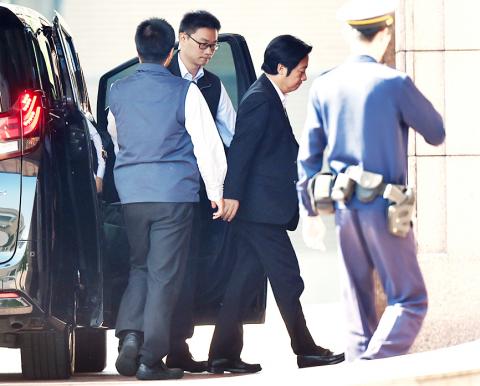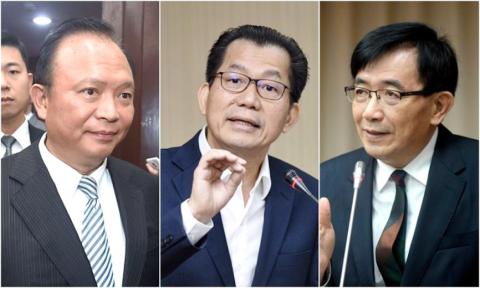Premier William Lai (賴清德) yesterday initiated the first stage of Cabinet reforms after the Democratic Progressive Party’s (DPP) losses in the nine-in-one elections on Nov. 24, approving the resignation of three ministers.
Lai called a Cabinet-level meeting at the Executive Yuan in Taipei to discuss policy reforms, in which he approved resignations tendered by Minister of Transportation and Communications Wu Hong-mo (吳宏謀), Environmental Protection Administration Minister Lee Ying-yuan (李應元) and Council of Agriculture Minister Lin Tsung-hsien (林聰賢).
All ministers were at the meeting except Hakka Affairs Council Minister Lee Yong-te (李永得), who had prior engagements, but had rendered a report on ways to improve his agency prior to the meeting.

Photo: Liao Chen-huei, Taipei Times
After the results of the elections were announced on Sunday last week, Wu, Lee Ying-yuan and Lin had tendered verbal resignations to Lai, and they yesterday again expressed their desire to resign after presenting reports on how to improve their organizations, Executive Yuan spokeswoman Kolas Yotaka told a post-meeting news conference.
They were steadfast in their resolve to resign, as they believed their policies had failed to gain the public’s trust, she said, adding that Lai approved the resignations following the meeting.
From Tuesday, the politically appointed deputy ministers at the three ministries are to take over as acting ministers, Kolas said, adding that the premier would announce their successors in due time.

Taipei Times file photo
Lai did not give any instruction after the three-hour meeting, but was to have all the suggestions made by his Cabinet members organized by last night so that he could process the information and personally report to the public in detail at a future news conference how policy reforms would be carried out, she said.
However, he did offer some remarks regarding the DPP’s election rout, she added.
The DPP did not win people’s trust after it became the ruling party for the second time because it failed to think from the public’s perspective, Kolas quoted Lai as saying.
“We admit that our communication with the public was less than ideal and that we were unable to promptly address public complaints,” Lai was quoted as saying.
“It is the shared opinion of all Cabinet-level agencies that the reforms led by the government should be able to give people hope,” he was quoted as saying. “We must realize that it is the government’s responsibility to lessen people’s burden. We must stand by every family through the hardships in their lives.”
“While we [the government] have our core values, we must take a more humanistic approach backed by more humanistic policy explanations, so that people will understand,” he was quoted as saying.
Several ministers also blamed the DPP’s election losses on the administration’s penchant for touting “cold” figures about its achievements, which failed to win the hearts of people, Kolas said.
Additionally, not only had the government been “virtually defenseless and inert” against the dissemination of disinformation, it had also been inept at using popular social media to communicate with the public in their language, she cited some officials as saying.
Before the meeting ended, Lai, seeing that many ministry officials appeared to be frustrated, encouraged them to keep pushing policies that have won the public’s praise, while remediating the ones that need improvement, Kolas said.

US President Donald Trump yesterday announced sweeping "reciprocal tariffs" on US trading partners, including a 32 percent tax on goods from Taiwan that is set to take effect on Wednesday. At a Rose Garden event, Trump declared a 10 percent baseline tax on imports from all countries, with the White House saying it would take effect on Saturday. Countries with larger trade surpluses with the US would face higher duties beginning on Wednesday, including Taiwan (32 percent), China (34 percent), Japan (24 percent), South Korea (25 percent), Vietnam (46 percent) and Thailand (36 percent). Canada and Mexico, the two largest US trading

ACTION PLAN: Taiwan would expand procurement from the US and encourage more companies to invest in the US to deepen bilateral cooperation, Lai said The government would not impose reciprocal tariffs in retaliation against US levies, President William Lai (賴清德) said yesterday, as he announced five strategies to address the issue, including pledging to increase Taiwanese companies’ investments in the US. Lai has in the past few days met with administrative and national security officials, as well as representatives from various industries, to explore countermeasures after US President Donald Trump on Wednesday last week announced a 32 percent duty on Taiwanese imports. In a video released yesterday evening, Lai said that Taiwan would not retaliate against the US with higher tariffs and Taiwanese companies’ commitments to

‘SPECIAL CHANNEL’: Taipei’s most important tasks are to stabilize industries affected by Trump’s trade tariffs and keep negotiations with Washington open, a source said National Security Council Secretary-General Joseph Wu (吳釗燮) arrived in the US for talks with US President Donald Trump’s administration, a source familiar with the matter said on Friday. Wu was leading a delegation for a meeting known as the “special channel,” the Financial Times reported earlier. It marked Trump’s first use of the channel since returning to the White House on Jan. 20. Citing a source familiar with the matter, the Financial Times reported that Minister of Foreign Affairs Lin Chia-lung (林佳龍) was also a part of the delegation. The visit came days after China concluded war games around Taiwan and amid Trump’s

CHIP EXCEPTION: An official said that an exception for Taiwanese semiconductors would have a limited effect, as most are packaged in third nations before being sold The Executive Yuan yesterday decried US President Donald Trump’s 32 percent tariff on Taiwanese goods announced hours earlier as “unfair,” saying it would lodge a representation with Washington. The Cabinet in a statement described the pledged US tariffs, expected to take effect on Wednesday next week, as “deeply unreasonable” and “highly regrettable.” Cabinet spokeswoman Michelle Lee (李慧芝) said that the government would “lodge a solemn representation” with the US Trade Representative and continue negotiating with Washington to “ensure the interests of our nation and industries.” Trump at a news conference in Washington on Wednesday announced a 10 percent baseline tariff on most goods